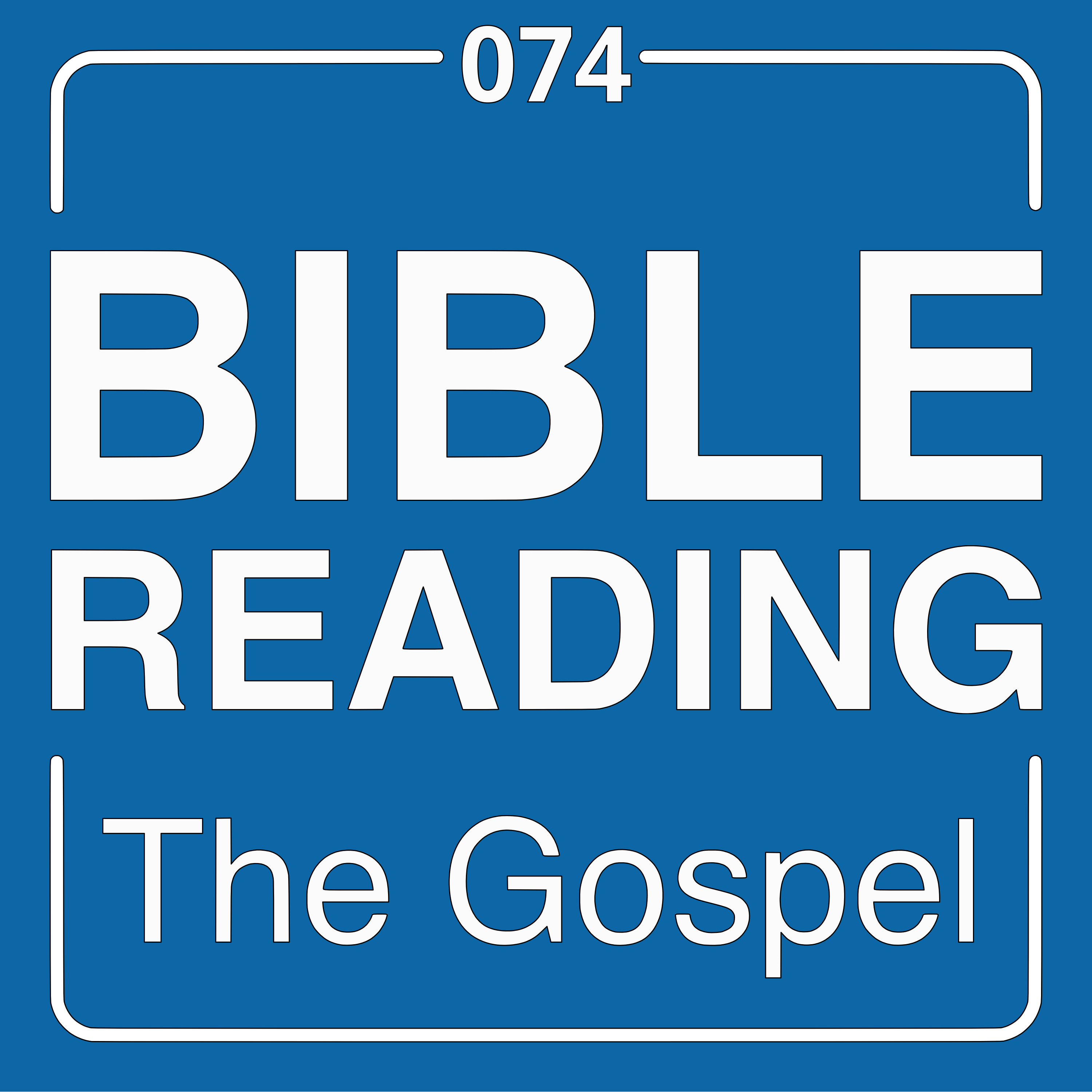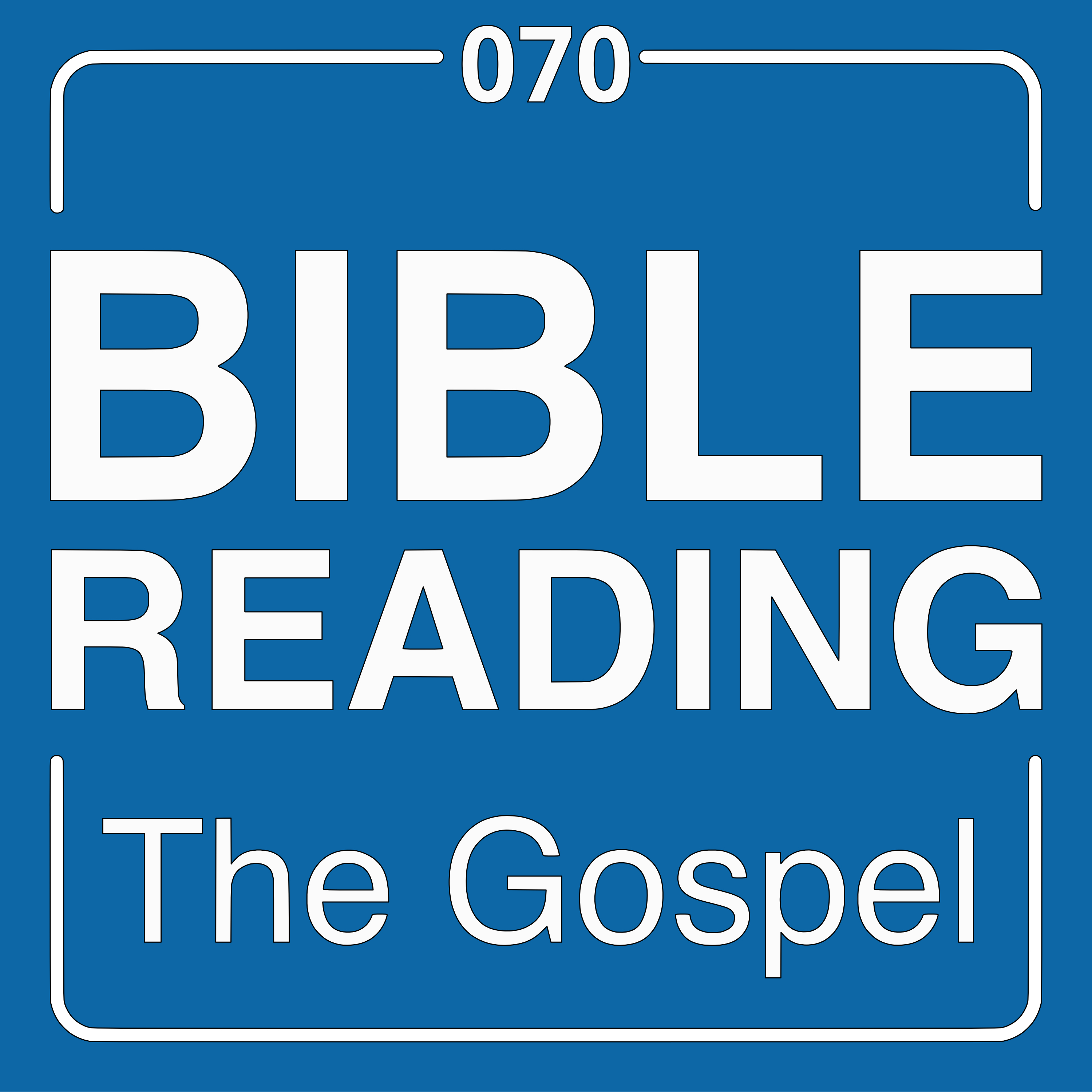Episode Transcript
[00:00:24] Speaker A: Hello, I'm Josh.
[00:00:24] Speaker B: And I'm Gabriel.
[00:00:25] Speaker A: And today on reading the Gospel, we are studying the event Jesus trial before Herod. This takes place in Luke chapter 23, verses 6 through 12.
We're going to start reading actually in verse 4. Follow along with us as we begin Luke 23, verse 4.
[00:00:47] Speaker B: Pilate said to the chief priests and the crowd, I find no guilt in this man, that is Jesus. But they were urgent saying he stirs up the people teachings throughout all Judea, from Galilee, even to this place.
When Pilate heard this, he asked whether the man was a Galilean. And when he learned that he belonged to Herod's jurisdiction, he sent him over to Herod, who was himself in Jerusalem at that time.
[00:01:20] Speaker A: When Herod saw Jesus, he was very glad for, for he had long desired to see him because he had heard about him and he was hoping to see some sign done by him. So when he questioned him at some length, but he made no answer, the chief priests and the scribes stood by vehemently accusing him. And Herod with his soldiers treated him with contempt and mocked him. Then arraying him in splendid clothing, he sent him back to Pilate. And Herod and Pilate became friends with each other that very day. For before this, they had been at enmity with each other.
So this Herod that we see, is this the same Herod who called for the soldiers to go and kill all the babies? Is this the Herod we read throughout the story of Jesus?
[00:02:09] Speaker B: It seems to be that this is his son that was Herod the Great. This is Herod Antipas.
And he was appointed as governor of Galilee and Perea, that is the kingdom of Jordan today, east of the river Jordan. He was appointed while his father was living and he was confirmed later by the Roman emperor.
[00:02:34] Speaker A: So what's he doing down in Jerusalem?
[00:02:38] Speaker B: At the surface, a devout Jewish. And he came to worship gods during this week long festival of Passover.
On the other side, his character was very shaky because Jesus Christ referred to him as that fox.
In another instance, Jesus Christ talks about the leaven of Herod.
That means the bad influence of, of this Herod Antipas.
And this is by the way the same Herod who killed John the Baptist because he married the wife of his half brother, which was illegal, both from a biblical perspective as well as in the eyes of the Jews. And John the Baptist preached against this. And this is why his new wife Herodias really wanted to eliminate John the Baptist. And he was eventually decapitated and his head was presented to Herodias on a plate.
[00:03:44] Speaker A: Yeah.
So in this story that we're studying today, Pilate has just tried Jesus and not found any guilt in him. And so he, you know, it says they were at enmity with each other. So I imagine when he finds out he's Galilean Pius, like, oh, I can get rid of him. I can make this Herod's problem and stick him with this.
And so he sends him up to Herod.
And Herod doesn't take this as a slight, like, oh, why are you bothering me on my holiday, on my day off, you know, why are you coming here? He's excited because he's heard of Jesus.
[00:04:24] Speaker B: Before and he was looking forward to see Jesus. So we see this, Herod's dual contradictory opposite sides of his character and moral life. On one side, he was looking to meet Jesus, maybe even to witness a miracle. On the other side, he killed John the Baptist. And you'll see in the second part of this event that he mocked Jesus Christ.
What is very interesting is that his tension between different sides of his moral character were inherited from his father. His father built the temple in Jerusalem over a number of years, and this is why he was highly regarded by the Jews. On the other side, he ordered to kill all the babies younger than two years old in Bethlehem when Jesus Christ was born. Do we have this kind of tensions between the opposite sides of the moral character in our lives today?
[00:05:27] Speaker A: Of course, we see them everywhere. And Jesus warns about this when I like to use a term, cultural, like cultural Christian or cultural Jew. Here Herod would be a cultural Jew, not necessarily religious, but enjoying the customs and the culture of the Jewish nation. And so there's. You see this on the fence, this going both ways.
Jesus calls it lukewarm in Revelation when he describes the Laodicean church. Half in, half out.
One day you can be for Jesus, the next day you can be for Satan, depending on what conveniences you the most.
And we see this with cultural Christians as well. They might have been raised in the church. They don't necessarily believe in God. They might, but it's not really a high priority. It doesn't drive their life. They're just kind of, whatever, whatever I feel like doing, I'll do. And it's very dangerous because it brings you to these situations. You know, I wonder what would have happened if Jesus did a miracle.
Like, what would have Herod said? Would Herod have been happy and let Jesus go?
[00:06:52] Speaker B: We know from the Gospel that miracles, in fact, from the whole Bible, that miracles do not change People's hearts, yeah, they grab the attention.
Jesus Christ performed some miracles to support his divinity, divine nature, but those miracles did not change people's hearts that do not transform the character.
[00:07:18] Speaker A: Oh, no, I completely agree with that. But I wonder if Herod would have looked for a way to let Jesus go. His heart didn't necessarily change, but he got what he wanted. Whereas when Jesus is not answering, he's not answering Herod, he's not answering the scribes and the Pharisees, you know, the priests.
He's just standing there. Herod gets angry and irate and allows the abuse and mockery to go forward.
[00:07:51] Speaker B: The Bible says that Herod and his soldiers treated Jesus with contempt.
But at the same time, Herod might have perceived Jesus as being in contempt with his authority and the court because he didn't want to answer.
What can we learn from this story? When should we speak and when should we be silent?
[00:08:15] Speaker A: Yeah, that's a good question. I think it's slow to speak. Is always wise to ask for the Holy Spirit's guidance. And the Bible says that the Holy Spirit will give us words when we need them.
And I see this in Jesus, his constant connection to God, that he knows when to speak because he's continuing this connection.
Not only is he God, but he continues his connection with God the Father, that he knows when to be silent and when to speak. And I found that in my life, I found that God gives words to say that I never would have thought about in situations. And then he also says, be quiet in times where I'd want to share a story of my own, to sit and listen to someone else. And so I think God really does speak when we allow him to.
[00:09:13] Speaker B: Is it just God's instruction to Jesus that time to be silent? Or is there any reasoning behind that silence from which we can learn for our lives today?
[00:09:24] Speaker A: Well, I mean, if you talk to any lawyer, they tell you to be silent. Because when someone is out to get you, it doesn't matter what you say.
They're never going to use anything that would exonerate you. They're only going to use anything that you slip up and that will accuse you and make things worse.
[00:09:47] Speaker B: And so this is why we have the Fifth Amendments in the United States.
[00:09:51] Speaker A: The Council is to be quiet because you're not going to talk yourself out of.
I don't know anyone who talked themselves out of a conviction or out of a trial because they were so good at it. So, yeah, the law says, you know, lawyers say be quiet.
[00:10:12] Speaker B: And also I see this Silence as like a seal of approval over the ministry of Jesus Christ. Public ministry. Three and a half years when he started his ministry in Jerusalem, and now as a full circle, he finished his ministry in Jerusalem. His ministry was public. He was teaching in the temple. He was multiplying the. For thousands of people in the field, in the open, everyone had a chance to hear. And for sure, those news and the sermons of Jesus Christ had to reach those palaces of governors, courts. So they had a chance to hear.
And I think they were looking for something different this time, just for a miracle, for something, you know, supernatural or something, you know.
[00:11:06] Speaker A: Yeah, I mean, what great TV would it be if, you know, we have, well, you have the Penn and Teller fool us, the magicians who get on and people try to do magic tricks and look how popular that is or what. I don't watch tv, so I don't know when, I don't know if it's still running. But if someone was actually doing real miracles on tv, you would think it would probably skyrocket pretty high on the charts. And not necessarily because they cared for the person, but they want to see something cool like a little trick here or there. And so that's really how they were treating Jesus, as a magician or a performer or an entertainer, not someone who has the key to life.
[00:11:56] Speaker B: Because this Herod had killed John the Baptist, decapitating him, presenting his head on a plate to his new wife.
It seems that he was looking to meet Jesus Christ for a different reason. And one of those reasons, maybe multiple reasons, one of those reasons was he was afraid that John the Baptist has resurrected in the form of Jesus Christ. And Jesus is the new John who will take revenge against him. And maybe over time he was kind of released from this fear. And now he was looking for something, I don't know, entertaining or something new, something special, but not something to transform his character.
[00:12:44] Speaker A: I see Herod is like his father, very narcissistic.
And if people play into him and his character, if they. They build him up and tell him he's such a good job, he's such a great person, he treats them well, but as soon as they threaten in any way his authority, his character, he's so weak a person that he breaks down and falls apart. And so it's interesting, the characteristics of the Father passed down to the Son, that he's dealing with some of the same attributes as his father, because, yeah, his father built the temple or finished restoring the temple, worked on the temple, but then he went out and he tried to kill all the babies and Herod, you know, there's the same things happening in his life.
I guess the lesson we can learn there is we need to be careful of what we're passing down to the next generation. Yes.
[00:13:50] Speaker B: Especially as parents.
[00:13:51] Speaker A: Yeah. Let's pray. Father God, I pray that you help us to be authentic.
[00:13:56] Speaker B: Amen.
[00:13:56] Speaker A: In our Christianity, in our walk with you, that we are slow to talk, ready to listen, and ready to be prompted by your Holy Spirit at all times. I pray, Father, that we're also authentic in our lives, that our children and the next generation can learn from us and not fall into the traps of. Of Satan that are set around us. Please go with us. In Jesus name. Amen.
[00:14:22] Speaker B: Amen.



